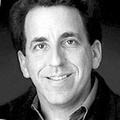Dean Ornish – The world now eats (and dies) like Americans (2006)
With all the legitimate concerns about AIDS and avian flu -- and we'll hear about that from the brilliant Dr. Brilliant later today -- I want to talk about the other pandemic, which is cardiovascular disease, diabetes, hypertension -- all of which are completely preventable for at least 95 percent of people, just by changing diet and lifestyle. And what's happening is that there's a globalization of illness occurring, that people are starting to eat like us, and live like us, and die like us. And in one generation, for example, Asia's gone from having one of the lowest rates of heart disease, and obesity, and diabetes to one of the highest. And in Africa, cardiovascular disease equals the HIV and AIDS deaths in most countries. So there's a critical window of opportunity we have to make an important difference that can affect the lives of literally millions of people, and practice preventive medicine on a global scale. Heart and blood vessel diseases still kill more people -- not only in this country, but also worldwide -- than everything else combined, and yet it's completely preventable for almost everybody. It's not only preventable, it's actually reversible. And for the last almost 29 years, we've been able to show that by simply changing diet and lifestyle, using these very high-tech, expensive, state-of-the-art measures to prove how powerful these very simple and low-tech and low-cost interventions can be like. Quantitative arteriography, before and after a year, and cardiac PET scans.
We showed a few months ago -- we published the first study showing you can actually stop or reverse the progression of prostate cancer by making changes in diet and lifestyle, and 70 percent regression in the tumor growth, or inhibition of the tumor growth, compared to only 9 percent in the control group. And in the MRI and MR spectroscopy here, the prostate tumor activity is shown in red -- you can see it diminishing after a year.
Now there is an epidemic of obesity. Two-thirds of adults and 15 percent of kids. What's really concerning to me is that diabetes has increased 70 percent in the past 10 years, and this may be the first generation in which our kids live a shorter life span than we do. That's pitiful, and it's preventable. Now these are not election returns, these are the people -- the number of the people who are obese by state, beginning in '85, '86, '87 -- these are from the CDC website -- '88, '89, '90, '91 -- you get a new category -- '92, '93, '94, '95, '96, '97, '98, '99, 2000, 2001 -- it gets worse. We're kind of devolving. Now what can we do about this? Well, you know, the diet that we've found that can reverse heart disease and cancer is an Asian diet. But the people in Asia are starting to eat like we are, which is why they're starting to get sick like we are. So I've been working with a lot of the big food companies. They can make it fun and sexy and hip and crunchy and convenient to eat healthier foods, like -- I chair the advisory boards to McDonald's, and PepsiCo, and ConAgra, and Safeway, and soon Del Monte, and they're finding that it's good business. The salads that you see at McDonald's came from the work -- they're going to have an Asian salad. At Pepsi, two-thirds of their revenue growth came from their better foods.
And so if we can do that, then we can free up resources for buying drugs that you really do need for treating AIDS and HIV and malaria and for preventing avian flu. Thank you.
http://www.ted.com/talks/dean_ornish_on_the_world_s_killer_diet.html

